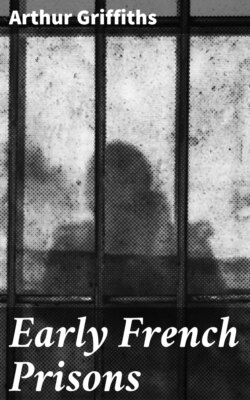Early French Prisons

Реклама. ООО «ЛитРес», ИНН: 7719571260.
Оглавление
Griffiths Arthur. Early French Prisons
Early French Prisons
Table of Contents
INTRODUCTION
EARLY FRENCH PRISONS. CHAPTER I. ORIGINS AND EARLY HISTORY
CHAPTER II. STRUGGLE WITH THE SOVEREIGN
CHAPTER III. VINCENNES AND THE BASTILE
CHAPTER IV. THE RISE OF RICHELIEU
CHAPTER V. THE PEOPLE AND THE BASTILE
CHAPTER VI. THE MAN WITH THE IRON MASK
CHAPTER VII. THE POWER OF THE BASTILE
CHAPTER VIII. THE TERROR OF POISON
CHAPTER IX. THE HORRORS OF THE GALLEYS
CHAPTER X. THE DAWN OF REVOLUTION
CHAPTER XI. LAST DAYS OF THE BASTILE
Отрывок из книги
Arthur Griffiths
Le Grand and Le Petit Châtelets; Vincennes; The Bastile; Loches; The Galleys; Revolutionary Prisons
.....
When the Knights Templars received permission to settle in Paris in the twelfth century, they gradually consolidated their power in the Marais, the marshy ground to the eastward of the Seine, and there laid the foundations of a great stronghold on which the Temple prison was a prominent feature. The knights wielded sovereign power with the rights of high justice and the very kings of France themselves bent before them. At length the arrogance of the order brought it the bitter hostility of Philippe le Bel who, in 1307, broke the power of the order in France. They were pursued and persecuted. Their Grand Master was tortured and executed while the King administered their estate. The prison of the Temple with its great towers and wide encircling walls became a state prison, the forerunner of Vincennes and the Bastile. It received, as a rule, the most illustrious prisoners only, dukes and counts and sovereign lords, and in the Revolutionary period it gained baleful distinction as the condemned cell, so to speak, of Louis XVI and Marie Antoinette.
The prison of Bicêtre, originally a bishop’s residence and then successively a house of detention for sturdy beggars and a lunatic asylum, was first built at the beginning of the thirteenth century. It was owned by John, Bishop of Winchester in England, and its name was a corruption of the word Winchester—“Vinchester” and so “Bichestre” and, eventually, “Bicêtre.” It was confiscated to the King in the fourteenth century and Charles VI dated his letters from that castle. It fell into a ruinous state in the following years and nothing was done to it until it was rebuilt by Louis XIII as a hospital for invalid soldiers and became, with the Salpêtrière, the abode of the paupers who so largely infested Paris. The hospital branch of the prison was used for the treatment of certain discreditable disorders, sufferers from which were regularly flogged at the time of their treatment by the surgeons. An old writer stigmatised the prison as a terrible ulcer that no one dared look at and which poisoned the air for four hundred yards around. Bicêtre was the home for all vagabonds and masterless men, the sturdy beggars who demanded alms sword in hand, and soldiers who, when their pay was in arrears, robbed upon the highway. Epileptics and the supposed mentally diseased, whether they were actually proved so or not, were committed to Bicêtre and after reception soon degenerated into imbeciles and raging lunatics. The terrors of underground Bicêtre have been graphically described by Masers-Latude, who had personal experience of them. This man, Danry or Latude, has been called a fictitious character, but the memoirs attributed to him are full of realism and cannot be entirely neglected. He says of Bicêtre:
.....